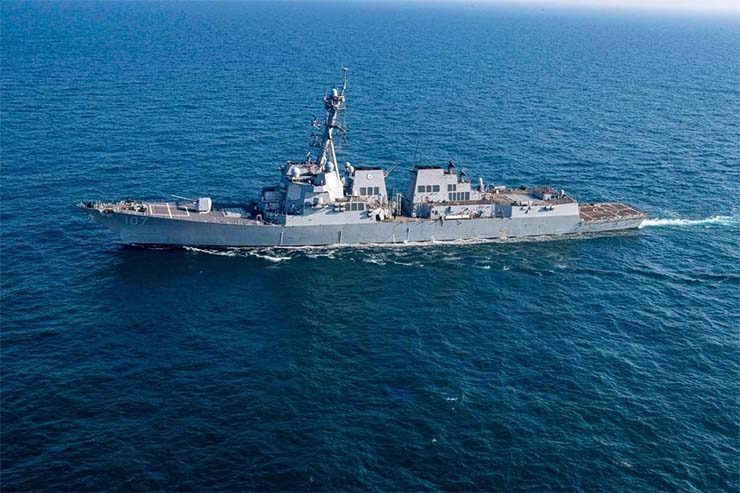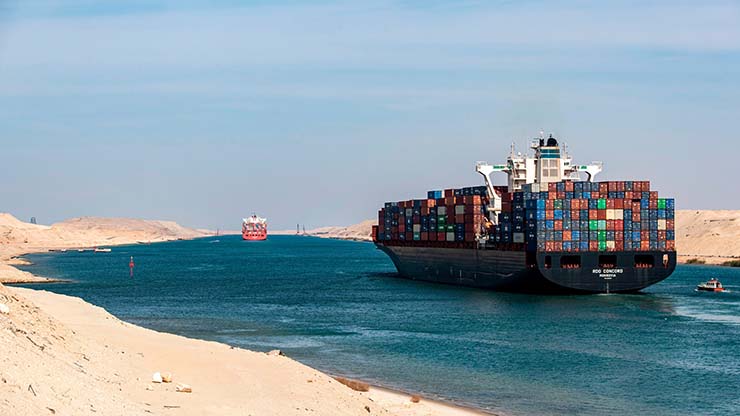
The US and the UK have launched eight attacks on Yemen, employing fighter jets and missiles in an effort to undermine the Houthi’s war capabilities, including their underground weapon storage facilities. Western media characterises these attacks as actions taken by the US and its allies; however, the primary actor is the US, with Britain playing the customary role of America’s ‘appendix.’ Concurrently, the US Treasury Department has imposed new sanctions targeting an Iraqi airline and multiple Middle Eastern groups with suspected ties to Iran’s Islamic regime, given Iran’s support for the Houthis.
The situation in the Red Sea has unsettled shipping companies, compelling them to steer clear of the Suez Canal and opt for an additional 6,438 km detour around Africa, taking an extra 10 days or more. This implies a lengthening of the supply chain and additional costs, which adversely affects the economies of poor and developing countries.
The Houthis have connected their attacks in the Red Sea to their demand for Israel to cease bombing Gaza. They have threatened to target vessels travelling to and from Israel if their demand is not met. Despite the US support and arming of Israel for ongoing attacks on Gaza, there is a pretence that Israel is not agreeing to the two-state solution for the Gaza crisis, as desired by Washington. According to a report by Israel’s Channel 12 on December 25, 2023, more than 20 ships and 244 US aircraft had delivered over 10,000 tons of armaments and military equipment to Israel since the commencement of the conflict. The question arises whether the US can compel Israel to accept the two-state solution by threatening to withdraw all support.
The US’s actions in attacking Yemen not only lack the sanction of the United Nations but also lack the approval of the US Congress. Notably, President Joe Biden has bypassed the US Congress in authorising additional funds and military assistance to Israel. In reality, the US Congress has consistently been ‘subordinated’ to America’s ‘Business of War.’ Since the onset of the conflict in Ukraine, the external debt of the United States has surged to an all-time high of US$33.5 trillion. However, unlike other countries, the US dollar is not tied to gold holdings, allowing it to continue printing dollars while the captive US Congress continues to raise the bar for its utilisation by the President of the United States.
The US’s actions in attacking Yemen not only lack the sanction of the United Nations but also lack the approval of the US Congress. Notably, President Joe Biden has bypassed the US Congress in authorising additional funds and military assistance to Israel. In reality, the US Congress has consistently been ‘subordinated’ to America’s ‘Business of War’
Russia has categorically labelled the US-UK attacks in Yemen as a violation of Article 51 of the UN Charter, emphasising the absence of any UN Security Council mandate for military action or an imminent threat to either the US or the UK that would justify pre-emptive measures. Iran has condemned the strikes as a “clear violation of Yemen’s sovereignty and territorial integrity,” citing breaches of international laws. Iran further stated that arbitrary attacks would only exacerbate insecurity and instability in the region. Turkish President Recep Tayyip Erdoğan accused the UK and the US of attempting to turn the region surrounding the Red Sea into “a sea of blood.”
There is little doubt that the US bears significant responsibility for the volatile situation in the Red Sea. With approximately 800 military bases spanning 80 countries, Washington appears to seek a broader conflict in the Middle East. This strategy, in collaboration with its allies, aims to target Yemen, Syria, Lebanon, and Iran, although a direct US attack on Iran seems improbable.
The situation in Gaza appears to be protracted despite extensive military actions by Israel. Reports suggest that only a fraction of Hamas’ capabilities has been addressed. Additionally, clashes between the Israeli Defence Forces (IDF) and Egyptian security forces, along with escalating tensions on the Hezbollah front, further complicate the conflict. The IDF has faced challenges, with 24 casualties reported in a single day of fighting with Hamas, even after deploying tanks back into Gaza.

Israel has acknowledged a Hezbollah rocket attack on its Meron Air Control Centre, rendering it non-operational and limiting IDF military flights. Israeli media suggests that Hezbollah has significantly impacted the economy of northern Israel and shows no willingness to withdraw from the borders, leading to considerations of an attack on Lebanon. However, attacking Hezbollah on Lebanese soil poses challenges, as evidenced by Israel’s experiences in 2006.
Despite the US-UK attacks, the Houthis persist in targeting US naval ships with limited success, while achieving hits on US-owned and other merchant vessels. On November 19, 2023, the Houthis seized MV ‘Galaxy Leaser,’ diverting it to the Hodeidah Port in Yemen. On December 23, the Israel-owned MV ‘Chem Pluto,’ en route to India, suffered a drone hit. On January 15, 2024, the US-owned MV ‘Gibraltar Eagle’ was struck by a Houthi missile in the Gulf of Aden. The following day, on January 16, MV ‘Zografia,’ travelling from Vietnam to Israel with a crew of 24, was directly hit by a Houthi missile.
On January 16, Yemen announced, “The Yemeni Armed Forces confirm the continuation of commercial traffic in the Arab and Red Seas to all destinations, with the exception of the ports of occupied Palestine. They continue to take all defensive and offensive measures within the framework of the right to defend and resist American-British aggression.” On January 17, the US-owned bulk carrier, ‘Genco Picardy,’ was damaged by a Houthi drone. Since November of the previous year, the Houthis have launched at least 34 attacks on shipping through the waterways leading up to the Suez Canal. The US experienced casualties, losing two marines in an attempt to board a Yemeni vessel.
With approximately 800 military bases spanning 80 countries, Washington appears to seek a broader conflict in the Middle East. This strategy, in collaboration with its allies, aims to target Yemen, Syria, Lebanon, and Iran, although a direct US attack on Iran seems improbable
Before the recent series of US-UK air and missile attacks, Yemen had already faced a decade of similar assaults from the US-supported Saudi Arabia. Despite these attacks, the number of Houthi cadres has continued to rise, with some analysts estimating it to be around 30-35,000. The US, through its actions in the Middle East over the past decades, inadvertently contributed to Syria being welcomed back into the Arab fold and hinted at a potential Iran-Saudi Arabia reconciliation. The US-backed Israeli actions against Palestine have further united the Middle East. Consequently, the Houthis are positioning themselves as champions against Western imperialism or the so-called White Taliban Organisation, revelling in the confrontation with the US and Israel.
The ongoing US-UK attacks, which seemingly have not deterred the Houthis from targeting vessels they perceive as hostile, suggest that the Red Sea predicament is likely to persist as a challenge for merchant shipping for an extended period, possibly becoming more complex. The US and the UK find themselves in a challenging position, especially when considered alongside the ongoing conflicts in Ukraine and Gaza. Assertions by Western sources that the US-UK attacks in Yemen have diminished the Houthi war capabilities by 20 percent remain a subject of debate.
The Houthis possess an unlimited stock of weapons and state-of-the-art drones supplied by Iran. However, given the chance to target Western vessels, especially those from the US and the UK, and to exert pressure on European economies by restricting merchant vessels’ access to the Red Sea and Suez Canal, will other players become involved? Could the Houthis also receive arms from Russia, China, North Korea, and even Turkey if the genocide in Gaza is not halted? The situation may further complicate if the Houthis are assisted in acquiring underwater attack capabilities.
-The author is an Indian Army veteran. The views expressed are personal and do not necessarily reflect the views of Raksha Anirveda








